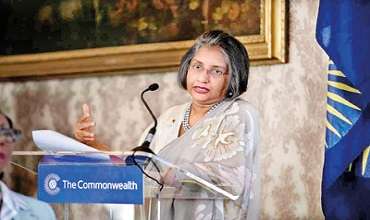Feature: Mark of a Leader - Don’t judge people by what you hear!

By Timothy A. Edward
Do not judge a book by its cover. It is important to exercise due diligence and seek the truth before passing judgement. This applies to both personal and professional relationships. Listen actively, seek multiple perspectives, and consider the context before forming opinions or taking action.
Managing by Insight, Not Gossip
Rushing into conclusions, particularly based on fleeting observations or hearsay, can lead to misinterpretations and hinder effective decision-making.
'Management by walking around' (MBWA) and 'hearing what others are saying' are common leadership practices. However, relying solely on these methods can be a recipe for disaster. ‘A talebearer reveals secrets, but he who is trustworthy keeps a matter confidential’.
Permanent vs. Temporary
Leaders must develop the ability to differentiate permanent factors from temporary fluctuations. A temporary setback may feel like a permanent failure, prompting hasty decisions that can derail progress. Conversely, ignoring a permanent underlying issue in favour of short-term solutions only postpones the inevitable.
This skill is rooted in psychological resilience, which is the ability to adapt and recover from adversity, trauma, or stress and the ability to bounce back from adversity while learning from experiences.
By focusing on the root causes of issues rather than surface-level observations, leaders can adopt a proactive, solution-oriented approach. In leadership, this means prioritising long-term goals, building enduring relationships, and making decisions with ethical and sustainable considerations.
Seeing the Big Picture
Always see the bigger picture. A leader must consider the larger context, understand the interconnection of different elements, and make decisions that align with the overall vision and purpose. This requires looking beyond immediate challenges and embracing a long-term perspective.
Effective leaders are also visionaries, capable of weaving a compelling narrative that inspires and motivates. This vision, however, is not merely a personal ambition but a shared aspiration that aligns with the collective goals of the team and the organisation.
This approach resonates with Maslow's Hierarchy of Needs, tapping into the need for self-actualisation and contributing to something greater than oneself.
The Power of Conviction
Passionately follow what you want to create. Leadership is not merely about setting goals but about driving them forward with unwavering conviction. However, conviction must be coupled with humility and open-mindedness to learn and adapt as needed.
Passion fuels the fire of inspiration, igniting the collective energy needed to overcome challenges and achieve ambitious targets. Emotional intelligence plays a vital role here, enabling leaders to connect with their followers on an emotional level, fostering a sense of shared purpose and belief in the vision. This emotional resonance is critical in overcoming resistance and mobilising individuals towards collective action.
Emotional intelligence refers to the ability to understand and manage one's emotions and those of others. Emotions such as love, joy, peace, patience, kindness, goodness, faithfulness, gentleness, and self-control reflect a high level of emotional intelligence, enabling individuals to build strong relationships and navigate life's challenges with wisdom and grace.
Sharing with Caution
While sharing the vision is essential, leaders must be mindful of their audience. Not everyone embraces change or shares the same level of enthusiasm for a new direction. Sharing the vision prematurely with those who may stand to benefit from its failure can lead to sabotage and unnecessary setbacks. The social comparison theory, emphasises the need for leaders to carefully consider the potential impact of sharing their vision with individuals who may feel threatened or insecure by it.
When sharing your vision, be careful not to overshare or come across as arrogant. Present your ideas clearly, listen attentively to feedback, and be open to adjustments. Be mindful of your audience and tailor your communication accordingly. This principle aligns with strategic management, where leaders carefully choose the timing and audience for information dissemination.
Building a Personal Brand
A true leader's impact transcends the confines of their organisation. By developing a personal brand that resonates with values and expertise, leaders can become thought leaders, influencing industry practices and driving positive change beyond their immediate scope.
A good name is more desirable than great riches; to be esteemed is better than silver or gold. Building a personal brand is about establishing a reputation based on integrity, competence, and reliability. This takes time, effort, and consistency in actions and words. Cultivate a strong work ethic, be known for your ethical behaviour, and consistently strive for excellence in everything you do. This principle aligns with the social identity theory, where individuals derive a sense of belonging and purpose from aligning themselves with a particular group or cause.
By establishing a strong personal brand, leaders contribute to a wider conversation, inspiring others to embrace their own unique talents and pursue their passions. This ripple effect of influence creates a positive feedback loop, fostering a culture of innovation and progress within and beyond the organisation.
Leadership is not about knowing all the answers but about fostering a culture of understanding, purpose, and shared vision. By cultivating a culture of trust, transparency, and shared responsibility, leaders can empower their teams to become efficient and effective to achieve extraordinary feats, leaving a lasting legacy that extends far beyond the confines of the organisation. In the words of Eleanor Roosevelt, 'The future belongs to those who believe in the beauty of their dreams.'
-
Still No Comments Posted.















Leave Comments